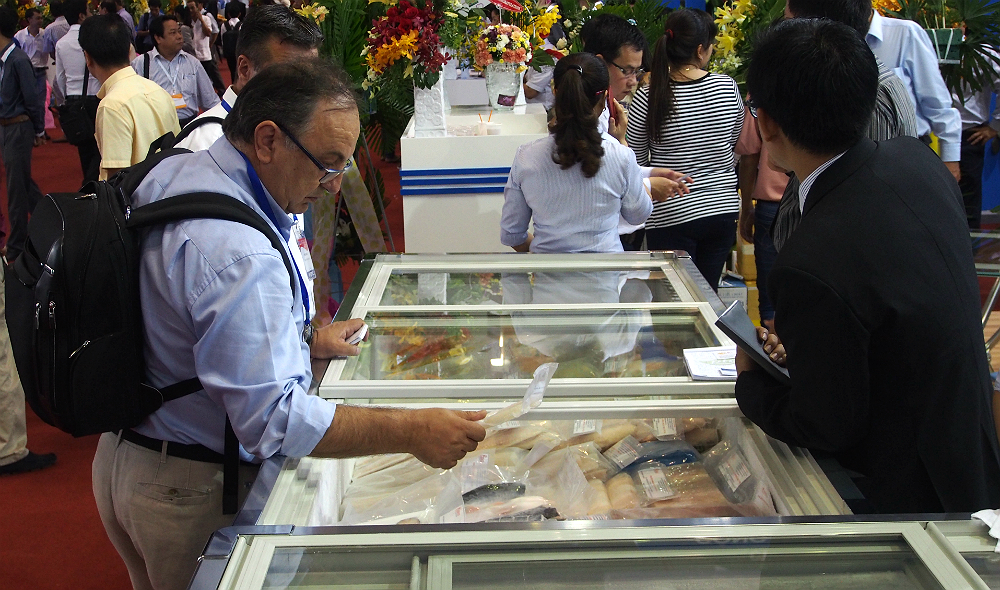The Vietnam Association of Seafood Exporters and Processors (VASEP) has asked local catfish exporters to improve the quality of their exported products by producing and processing them in a more sustainable manner.
Domestic catfish farmers and exporters should improve the quality of fish production in accordance with the global standards with more transparency, especially in the ratio of gross weight and maximum content of water in their catfish fillets, said Truong Dinh Hoe, VASEP chairman.
More promotional campaigns should also be held in the European Union (EU) to boost the image of Vietnamese catfish there, he added.
Hoe’s recommendation came out at the Vietnam Catfish Forum-Vietfish 2014, part of the Vietfish exhibition that wrapped up on August 8 at Saigon Exhibition and Convention Center (SECC) in District 7, Ho Chi Minh City.
The 3-day event, organized by VASEP, highlighted the “Establishing a Sustainable Catfish Supply Chain in Vietnam – SUPA” project, which is co-sponsored by the European Commission, VASEP, and partners of SUPA – the Vietnam National Cleaner Production Center, World Wide Fund for Nature Vietnam, and World Wide Fund for Nature Austria.
Entitled “The sustainable Growth for Catfish in the European Market,” the forum stressed the importance of sustainable development for catfish farming, processing, and exporting in Vietnam.
Catfish, also known as pangasius, is the staple of Vietnam, accounting for over 25 percent of its total seafood export value, and making up over 95 percent of the total export revenue of the world’s catfish industry, according to what was discussed at the forum.
Vietnamese catfish have been exported to over 150 countries and territories worldwide with sales of over US$1.8 billion per year, the chairman said, adding that the EU occupies a 21 percent share of the export revenue of Vietnam.
However, since 2011, catfish consumed in the EU began to fall into a downward trend, causing significant impacts to the Vietnamese catfish industry, forcing all those concerned to find solutions to maintain the exports to the bloc and the world market, said VASEP chairman Hoe.
According to Hoe, from an overseas market accounting for about 50 percent of the total export value of Vietnamese catfish, shipments to the EU have dropped steadily in turnover to just over 20 percent currently.
The export revenue decreased from $590 million in 2012 to $385.4 million in 2013, while sale prices also plunged from 2.05 euros per kilogram in 2012 to 1.74 euros per kilogram in 2014.
The main causes for the reduction included the economic crisis in both the EU and Vietnam, pressure from the export of other kinds of seafood, and the competition among Vietnamese exporters.
In addition, false information about catfish production is the main cause leading to reduced consumption of catfish.
In order to remove obstacles and difficulties for the catfish industry so that it can continue to develop, the government of Vietnam has committed itself to improving the entire value chain of catfish with a new decree.
Decree No. 36/2014/ND-CP regards catfish farming, processing, and exporting. It was released in late May 2014, and also regulates the glazing on exported catfish and the maximum water content in catfish fillets.
Accordingly, the glazing ratio – the water ratio in gross weight – should be appropriate to the regulations of the importing countries. Other circumstances state that the glazing ratio should not exceed 10 percent. Meanwhile, the maximum content of water in catfish fillets should not surpass 83 percent of the net weight of unfrozen catfish fillets.
Together with efforts from the government, the SUPA project, Vietnam and the EU have set the year 2020 as the target date for a safer, more environmentally friendly and more economically sustainable catfish industry of Vietnam, the VASEP chairman said.
Like us on Facebook or follow us on Twitter to get the latest news about Vietnam!


















































